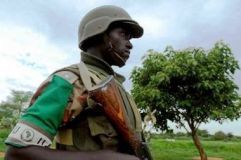Sudan risks sanctions if it fails to meet Addis Ababa agreement-UK
April 26, 2007 (LONDON) — The British government has warned that Sudan is facing international sanctions if it fails to honor a comprise reached with the African Union and the international community in Addis Ababa last year on the deployment of AU-UN force in Darfur.
 Ambassador at Large for the Sudan Peace Process, Christopher Prentice, has warned that the government of President Umar al-Bashir will face international sanctions if it fails to meet its commitments to stop the violence in Darfur in accordance with the Addis Ababa agreement that provides for a UN-African “joint force” to keep the peace in the war-torn region.
Ambassador at Large for the Sudan Peace Process, Christopher Prentice, has warned that the government of President Umar al-Bashir will face international sanctions if it fails to meet its commitments to stop the violence in Darfur in accordance with the Addis Ababa agreement that provides for a UN-African “joint force” to keep the peace in the war-torn region.
Regarding the sanctions, Ambassador Prentice said, “The international community is adopting a two-track policy on Sudan: persuasion and pressure, the London based al-Hayat reported.
He indicated that they will tighten the current sanctions imposed in accordance with UN Security Council Resolution 1591 and other resolutions against individuals that are obstructing the peace process. “As the Prime Minister, Tony Blair, has said, we began discussions in New York to impose specific sanctions.” He said.
The UK envoy added that the exact sanctions package is still being discussed but the sanctions will be limited and specific to deal with the violations that we are seeing. There will be more monitoring of the illegal aerial strikes such as the one that took place and represented a violation of past Security Council resolutions — the bombing of the meeting site of the rebel leaders in the fall.
Limitations will also be imposed on individuals if it is found out that they acted to impede the peace process or sought to carry out specific acts of violence. These will be added to the list of the individuals on whom sanctions are imposed. “We would also like to see the current ban on arms in Darfur alone to be expanded.”
There will also be other elements in the projected sanctions that are being discussed”. He clarified, “There is no specific time to impose these sanctions. I believe that it was President George W. Bush who used the expression Sudan has one last chance. We did not use this expression.
We are still in the stage of continuing diplomacy, continuing the pressures, and continuing the persuasion because what we wish to reach is peace. But there should be a price to pay by the rebels that refuse to march in the peace process and that insist on continuing the violence. “There should also be a price for the Sudanese government to pay if it fails to implement its commitments in accordance with the Addis Ababa agreement. But we hope that sanctions will not be necessary at the end of the day”.
Prentice criticized “elements in the Sudanese government that are betting on a military solution to the conflict in Darfur. We have advised the Sudanese government not to resort to a military solution but our advice went unheeded in November. We are now seeing the consequences of that”.
Ambassador Christopher Prentice praised the role that the countries in the region are playing to bring about process in solving the Darfur issue. He welcomed the agreement that was reached on 9 April regarding the heavy support package between the United Nations and Sudan.
However, he said that this agreement “is simply a reiteration of the agreement that was reached in November”. He stressed that the agreement on the heavy support package “alone is not enough to provide the international force” that is required to ensure stability in Darfur. He said that in order to ensure that, “there should be a hybrid (UN-African) force”.
He added that consultations are being held in this regard and “a proposal will be submitted to Khartoum soon regarding the formation of this force”.
He stressed that there is no hidden agenda behind the pressure that his country is putting on Sudan regarding the deployment of the joint force in Darfur. He clarified that the African Union itself asked for support from the international community since it is unable alone to carry out the task entrusted to it.
Sudanese government, African Union and the United Nations reached an agreement in Addis Ababa on Nov 16, 2006 on three points: (1) to fix the rules of the expected Darfur peace talks (2) to strengthen the ceasefire in Darfur (3) to deploy a peacekeeping force in Darfur.
This last part of the agreement is based on reinforcing the African Union’s force with troops from the United Nations and a command and control structure from the United Nations. The process in Darfur will thus be a joint UN-African force. This is to be achieved in three stages: A light security support package, a heavy security support package (3000), and the finalization of a fully hybrid force (17000).
This was agreed upon in November. We are now approaching the end of April but, unfortunately, no actual progress has been made to implement this agreement”.
(ST)
